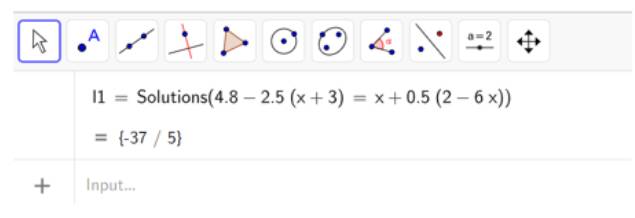Giải các phương trình sau:
a) 5(x−1)−(6−2x)=8x−3
b) \(\frac{{2{\rm{x}} - 1}}{3} - \frac{{5 - 3{\rm{x}}}}{2} = \frac{{x + 7}}{4}\)
Hãy nhập câu hỏi của bạn vào đây, nếu là tài khoản VIP, bạn sẽ được ưu tiên trả lời.

a) \(y' = 2.3{{\rm{x}}^2} - \frac{1}{2}.2{\rm{x}} + 4.1 - 0 = 6{{\rm{x}}^2} - x + 4\).
b) \(y' = \frac{{{{\left( { - 2{\rm{x}} + 3} \right)}^\prime }.\left( {{\rm{x}} - 4} \right) - \left( { - 2{\rm{x}} + 3} \right).{{\left( {{\rm{x}} - 4} \right)}^\prime }}}{{{{\left( {{\rm{x}} - 4} \right)}^2}}}\)
\( = \frac{{ - 2\left( {{\rm{x}} - 4} \right) - \left( { - 2{\rm{x}} + 3} \right).1}}{{{{\left( {{\rm{x}} - 4} \right)}^2}}}\)
\( = \frac{{ - 2{\rm{x}} + 8 + 2{\rm{x}} - 3}}{{{{\left( {{\rm{x}} - 4} \right)}^2}}} = \frac{5}{{{{\left( {{\rm{x}} - 4} \right)}^2}}}\)
c) \(y' = \frac{{{{\left( {{x^2} - 2{\rm{x}} + 3} \right)}^\prime }\left( {{\rm{x}} - 1} \right) - \left( {{x^2} - 2{\rm{x}} + 3} \right){{\left( {{\rm{x}} - 1} \right)}^\prime }}}{{{{\left( {{\rm{x}} - 1} \right)}^2}}}\)
\( = \frac{{\left( {2{\rm{x}} - 2} \right)\left( {{\rm{x}} - 1} \right) - \left( {{x^2} - 2{\rm{x}} + 3} \right).1}}{{{{\left( {{\rm{x}} - 1} \right)}^2}}}\) \( = \frac{{2{{\rm{x}}^2} - 2{\rm{x}} - 2{\rm{x}} + 2 - {x^2} + 2{\rm{x}} - 3}}{{{{\left( {{\rm{x}} - 1} \right)}^2}}}\)
\( = \frac{{{x^2} - 2{\rm{x}} - 1}}{{{{\left( {{\rm{x}} - 1} \right)}^2}}}\)
d) \(y' = {\left( {\sqrt 5 .\sqrt x } \right)^\prime } = \sqrt 5 .\frac{1}{{2\sqrt x }} = \frac{{\sqrt 5 }}{{2\sqrt x }} = \frac{5}{{2\sqrt {5x} }}\).

\(a,\left(\dfrac{1}{3}\right)^{2x+1}\le9\\ \Leftrightarrow2x+1\ge-2\\ \Leftrightarrow2x\ge-3\\ \Leftrightarrow x\ge-\dfrac{3}{2}\)
\(b,4^x>2^{x-2}\\ \Leftrightarrow2^{2x}>2^{x-2}\\ \Leftrightarrow2x>x-2\\ \Leftrightarrow x>-2\)

\(a,\left(\dfrac{1}{4}\right)^{x-2}=\sqrt{8}\\ \Leftrightarrow\left(\dfrac{1}{2}\right)^{2x-4}=\left(\dfrac{1}{2}\right)^{-\dfrac{3}{2}}\\ \Leftrightarrow2x-4=-\dfrac{3}{2}\\ \Leftrightarrow2x=\dfrac{5}{2}\\ \Leftrightarrow x=\dfrac{5}{4}\)
\(b,9^{2x-1}=81\cdot27^x\\ \Leftrightarrow3^{4x-2}=3^{4+3x}\\ \Leftrightarrow4x-2=4+3x\\ \Leftrightarrow x=6\)
c, ĐK: \(x-2>0\Rightarrow x>2\)
\(2log_5\left(x-2\right)=log_59\\
\Leftrightarrow log_5\left(x-2\right)^2=log_59\\
\Leftrightarrow\left(x-2\right)^2=3^2\\
\Leftrightarrow\left[{}\begin{matrix}x-2=3\\x-2=-3\end{matrix}\right.\\
\Leftrightarrow\left[{}\begin{matrix}x=5\left(tm\right)\\x=-1\left(ktm\right)\end{matrix}\right.\)
Vậy phương trình có nghiệm là x = 5.
d, ĐK: \(x-1>0\Leftrightarrow x>1\)
\(log_2\left(3x+1\right)=2-log_2\left(x-1\right)\\ \Leftrightarrow log_2\left(3x+1\right)\left(x-1\right)=2\\ \Leftrightarrow3x^2-2x-1=4\\ \Leftrightarrow3x^2-2x-5=0\\ \Leftrightarrow\left(3x-5\right)\left(x+1\right)=0\\ \Leftrightarrow\left[{}\begin{matrix}x=\dfrac{5}{3}\left(tm\right)\\x=-1\left(ktm\right)\end{matrix}\right.\)
Vậy phương trình có nghiệm \(x=\dfrac{5}{3}\)

Ta dùng lệnh Solutions(<Phương trình>) trên ô lệnh của cửa sổ CAS, kết quả sẽ hiển thị ngay bên dưới:
a)
Vậy phương trình đã cho có duy nhất nghiệm \(x=-\dfrac{37}{5}\)
b)

Vậy phương trình đã cho có vô số nghiệm.

a) Đây là kết luận đúng vì: \( - 6.2{y^2} = - 3y.4y\)
b) Đây là kết luận đúng vì: \(5{\rm{x}}\left( {x + 3} \right) = 5\left( {{x^2} + 3{\rm{x}}} \right) = 5{{\rm{x}}^2} + 15{\rm{x}}\)
c) Đây là kết luận đúng vì: \(3{\rm{x}}\left( {4{\rm{x}} + 1} \right)\left( {1 - 4{\rm{x}}} \right) = 3{\rm{x}}\left( {1 - 16{{\rm{x}}^2}} \right) = - 3{\rm{x}}\left( {16{{\rm{x}}^2} - 1} \right)\)

a) ĐKXĐ: x khác +2
\(\frac{x-2}{2+x}-\frac{3}{x-2}-\frac{2\left(x-11\right)}{x^2-4}\)
<=> \(\frac{x-2}{2+x}-\frac{3}{x-2}=\frac{2\left(x-11\right)}{\left(x-2\right)\left(x+2\right)}\)
<=> (x - 2)^2 - 3(2 + x) = 2(x - 11)
<=> x^2 - 4x + 4 - 6 - 3x = 2x - 22
<=> x^2 - 7x - 2 = 2x - 22
<=> x^2 - 7x - 2 - 2x + 22 = 0
<=> x^2 - 9x + 20 = 0
<=> (x - 4)(x - 5) = 0
<=> x - 4 = 0 hoặc x - 5 = 0
<=> x = 4 hoặc x = 5
làm nốt đi

a, \(y=3x^4-7x^3+3x^2+1\)
\(y'=12x^3-21x^2+6x\)
b, \(y=\left(x^2-x\right)^3\)
\(y'=3\left(x^2-x\right)^2\left(2x-1\right)\)
c, \(y=\dfrac{4x-1}{2x+1}\)
\(y'=\dfrac{4+2}{\left(2x+1\right)^2}\)
\(y'=\dfrac{6}{\left(2x+1\right)^2}\)
a: y=3x^4-7x^3+3x^2+1
=>y'=3*4x^3-7*3x^2+3*2x
=12x^3-21x^2+6x
b: \(y'=\left[\left(x^2-x\right)^3\right]'\)
\(=3\left(2x-1\right)\left(x^2-x\right)^2\)
c: \(y'=\dfrac{\left(4x-1\right)'\left(2x+1\right)-\left(4x-1\right)\left(2x+1\right)'}{\left(2x+1\right)^2}\)
\(=\dfrac{4\left(2x+1\right)-2\left(4x-1\right)}{\left(2x+1\right)^2}=\dfrac{6}{\left(2x+1\right)^2}\)

Khẳng định C là khẳng định sai vì:
Nếu: \(\frac{{x + 1}}{{x - 1}} = \frac{{{x^2} + x + 1}}{{{x^2} - x + 1}}\)
\(\begin{array}{l} \Rightarrow \frac{{x + 1}}{{x - 1}} - \frac{{{x^2} + x + 1}}{{{x^2} - x + 1}} = 0\\ \Rightarrow \frac{{\left( {x + 1} \right)\left( {{x^2} - x + 1} \right) - \left( {{x^2} + x + 1} \right)\left( {x - 1} \right)}}{{\left( {x - 1} \right)\left( {{x^2} - x + 1} \right)}} = 0\\ \Rightarrow \frac{{\left( {{x^3} + 1} \right) - \left( {{x^3} - 1} \right)}}{{\left( {x - 1} \right)\left( {{x^2} - x + 1} \right)}} = \frac{2}{{\left( {x - 1} \right)\left( {{x^2} - x + 1} \right)}} = 0\end{array}\)
\( \Rightarrow \) vô lý
a) 5(x−1)−(6−2x)=8x−3
=>5x−5−6+2x=8x−3
=> −x=8
=> x=−8
Vậy phương trình có nghiệm là x = -8
b)
\(\begin{array}{l}\frac{{2{\rm{x}} - 1}}{3} - \frac{{5 - 3{\rm{x}}}}{2} = \frac{{x + 7}}{4}\\\frac{{4\left( {2{\rm{x}} - 1} \right)}}{{12}} - \frac{{6\left( {5 - 3{\rm{x}}} \right)}}{{12}} = \frac{{3\left( {x + 7} \right)}}{{12}}\\8{\rm{x}} - 4 - 30 + 18{\rm{x}} = 3{\rm{x}} + 21\\8{\rm{x + 18x}} - 3{\rm{x}} = 21 + 4 + 30\\23{\rm{x}} = 55\\x = \frac{{55}}{{23}}\end{array}\)
Vậy phương trình có nghiệm là \(x = \frac{{55}}{{23}}\)